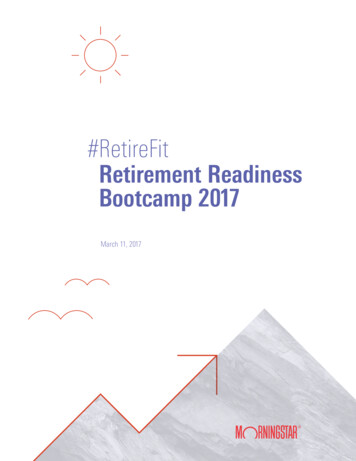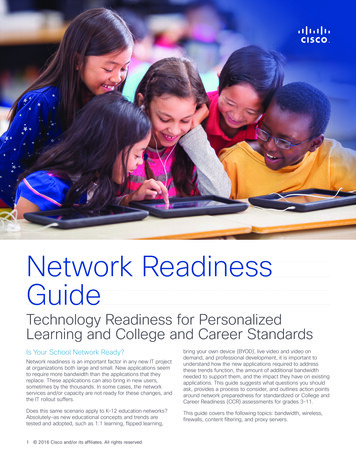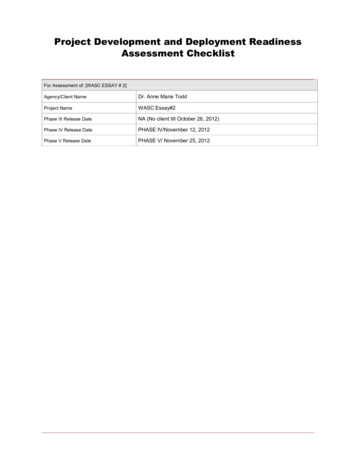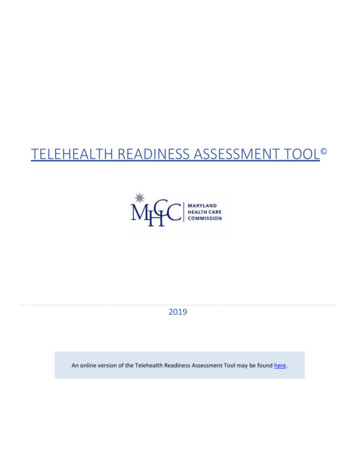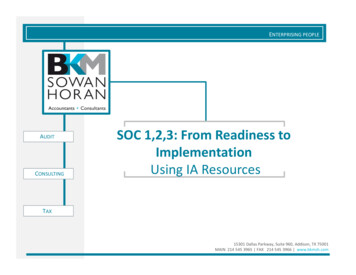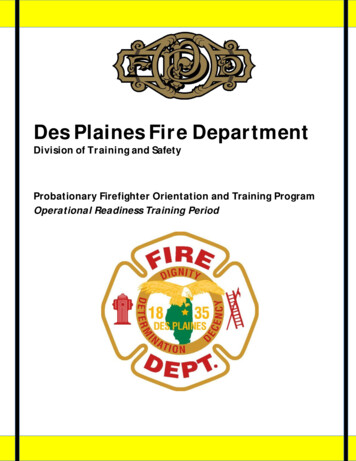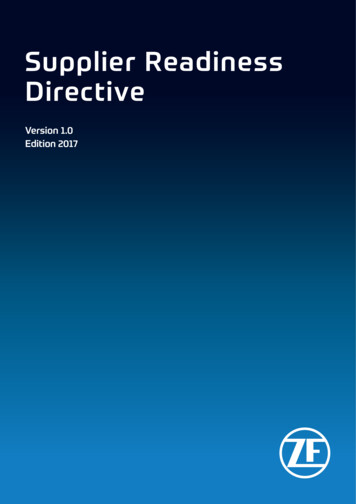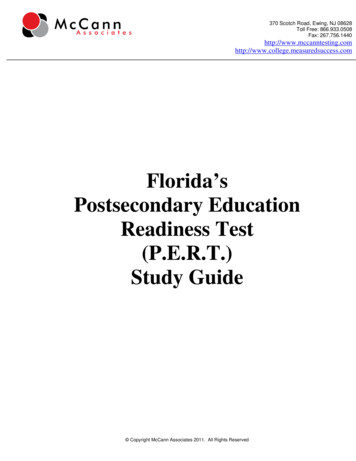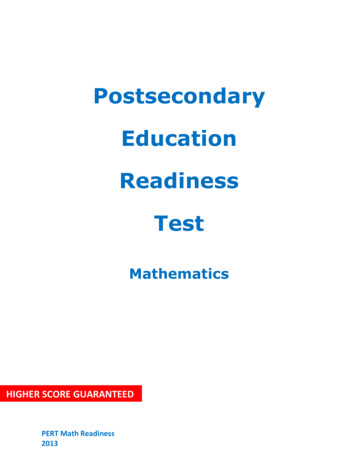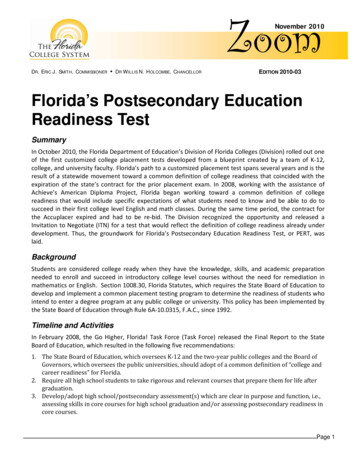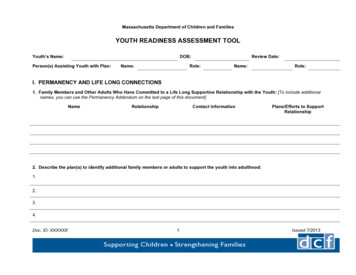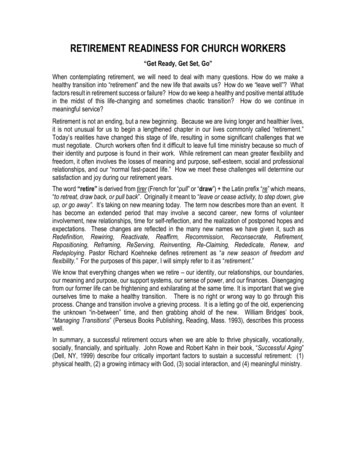
Transcription
RETIREMENT READINESS FOR CHURCH WORKERS“Get Ready, Get Set, Go”When contemplating retirement, we will need to deal with many questions. How do we make ahealthy transition into “retirement” and the new life that awaits us? How do we “leave well”? Whatfactors result in retirement success or failure? How do we keep a healthy and positive mental attitudein the midst of this life-changing and sometimes chaotic transition? How do we continue inmeaningful service?Retirement is not an ending, but a new beginning. Because we are living longer and healthier lives,it is not unusual for us to begin a lengthened chapter in our lives commonly called “retirement.”Today’s realities have changed this stage of life, resulting in some significant challenges that wemust negotiate. Church workers often find it difficult to leave full time ministry because so much oftheir identity and purpose is found in their work. While retirement can mean greater flexibility andfreedom, it often involves the losses of meaning and purpose, self-esteem, social and professionalrelationships, and our “normal fast-paced life.” How we meet these challenges will determine oursatisfaction and joy during our retirement years.The word “retire” is derived from tirer (French for “pull” or “draw”) the Latin prefix “re” which means,“to retreat, draw back, or pull back”. Originally it meant to “leave or cease activity, to step down, giveup, or go away”. It’s taking on new meaning today. The term now describes more than an event. Ithas become an extended period that may involve a second career, new forms of volunteerinvolvement, new relationships, time for self-reflection, and the realization of postponed hopes andexpectations. These changes are reflected in the many new names we have given it, such asRedefinition, Rewiring, Reactivate, Reaffirm, Recommission, Reconsecrate, Refirement,Repositioning, Reframing, ReServing, Reinventing, Re-Claiming, Rededicate, Renew, andRedeploying. Pastor Richard Koehneke defines retirement as “a new season of freedom andflexibility.” For the purposes of this paper, I will simply refer to it as “retirement.”We know that everything changes when we retire – our identity, our relationships, our boundaries,our meaning and purpose, our support systems, our sense of power, and our finances. Disengagingfrom our former life can be frightening and exhilarating at the same time. It is important that we giveourselves time to make a healthy transition. There is no right or wrong way to go through thisprocess. Change and transition involve a grieving process. It is a letting go of the old, experiencingthe unknown “in-between” time, and then grabbing ahold of the new. William Bridges’ book,“Managing Transitions” (Perseus Books Publishing, Reading, Mass. 1993), describes this processwell.In summary, a successful retirement occurs when we are able to thrive physically, vocationally,socially, financially, and spiritually. John Rowe and Robert Kahn in their book, “Successful Aging”(Dell, NY, 1999) describe four critically important factors to sustain a successful retirement: (1)physical health, (2) a growing intimacy with God, (3) social interaction, and (4) meaningful ministry.
2STEPS ALONG THE WAY“The first step towards getting somewhere is to decide you’re not going to stay where you are.”(John Pierpoint Morgan)Deciding when to retire may be difficult. Some questions that may help you make the decisioninclude: Are you still productive and finding your ministry fulfilling? Are you maintaining healthyrelationships with your staff, leaders, and members? Are you healthy spiritually, emotionally, andphysically? Have you already “retired in place”? Once you have prayerfully decided to retire, it ishelpful to announce your decision 6-12 months in advance to allow adequate time to bring closureto your ministry.The following are some thoughts and resources which may prove helpful as we work through thechallenges and opportunities of our transition into retirement.1. SPOUSE Always include your spouse in your discussions and decisions as you prepare for retirement.Be sensitive to the fact that your spouse will also be going through a challenging transition aswell. Your spouse is grieving many losses, even as you are going through the process. This isa time for listening and sharing.Men tend to have a more difficult time than working women making the transition to retirement,because women often have outside friendships and activities.Is your spouse retiring at the same time? How will retirement impact your marriage? How willyou manage the “togetherness/separateness” polarity? How will your roles change?Pay attention to maintaining a healthy marriage. This may require the assistance of a counselor.2. IDENTITY “For a church worker facing retirement, the most significant danger is not the loss of a futureincome, but the loss of a psychological future – the loss of one’s hope to make specific futurecontributions toward the Kingdom of God.” (“Finishing Well” by Nathan and Beth Davis)Apart from financial security, claiming your new identity is the most important factor for asuccessful transition into retirement. Retirement is not ending your opportunities for ministry.But, it does require you to redefine yourself. It involves looking inside yourself, at who you’vebecome, who you once were, and who you want to be as you move forward. It means that youmust deal with changing personal roles, identity, and calling. It invites you to identify your gifts,maximize your strengths, and pursue your passion. It is an opportunity to create a life thatreflects more closely who you are. In short, it is more about “being” than “doing.”The key question is “What will I do with the rest of my life?”It is helpful to take time to talk with co-workers who have retired successfully.This quest calls for a time of prayerful discernment to determine how you might connect yourpassion and gifts with your new life and opportunities for service.3. PERSONAL LIFE MISSION This is an opportune time to update or write your ‘’life mission statement”. You may begin bydefining a meaningful purpose for your anticipated retirement life. You may ask yourself what
3 you want to do that will fulfill you and help you to feel productive. In short, how can you makeproductive use of your retirement years?A useful tool for creating personal mission is “Life Mission: A Developmental Resource,” by LesStroh (lesstroh.com). This package includes 2 workbooks for a married couple to use as theywrite their personal mission statements.Consider journaling your feelings, experiences, dreams, and decisions as you make thistransition. William Bridges, in his book “Transitions, Making Sense of Life’s Changes” (1980)encourages journaling as the first step to finding meaning in retirement. Prayerfully ask yourself-- Where is God in this? or How is God speaking to me through this? You may want to includea list of the things for which you are grateful and keep adding to it.Make a list of your “life lessons,” and pass them along to family and friends as appropriate. Thismay be part of your legacy.4. LIFE PLANNING – YOUR VISION FOR YOUR FUTURE Write your “Personal Life Plan.” Google: Michael Hyatt, Creating Your Life Plan. Hisapproach is solid, balanced, and Biblical. He offers excellent templates for developing your lifeplan. Some of the reasons he gives for developing a Life Plan include: “A life plan will helpyou clarify your most important priorities, enable you to maintain balance, provide a filter bywhich you can say “no” to lesser things, equip you to envision a better future, serve as a roadmap for accomplishing what matters most, and will help ensure that you don’t finish life withregrets.”Include an intentional plan for intimacy with God. He will direct and sustain you in your transitionto a new life with Him in retirement.Key questions you may be asking yourself as you begin your retirement journey are: If you had enough money, how would you live your life? If your doctor told you that you have just five to ten years to live (and you would feel healthy),would you change our life and how would you do it? If your doctor told you that you had one day to live, is there anything left unfinished youwould want to do?Determine the core values you live by. Will they remain the same in retirement? These will helpguide your retirement planning. A helpful tool for looking at your core values can be found in“What Color Is Your Parachute for Retirement” (Nelson & Bolles), pages 46-72.Explore “activities” and a life-style that expresses your unique gifts and passions. Ask yourself- What do I really want to do with the time I have left?Ask yourself how you want to be remembered by God, your spouse, your children, your parents,your colleagues, and your friends.It is important to make time for your family, friends, and yourself.You may want to include meaningful volunteer work. This can be a wonderful time of personalrenewal and purposeful living.Explore and develop new interests, hobbies, and volunteer causes that will offer a sense ofproductivity, ways to meet new people, and build a sense of community.“Your vision will become clear only when you can look into your own heart.Who looks outside, dreams; who looks inside, awakens.”(Carl Jung, Swiss psychiatrist)
45. FINANCIAL SECURITY Prepare for and maintain financial stability. This includes a budget (projected income andexpenses).Review your pension plan, savings, investments, life insurance, annuities and other sources ofretirement income.Request your Medicare card from Social Security three months before your 65th birthday.Decide when to take Social Security benefits.Retirement Planning Tools you may want to use in this regard include: For those enrolled in the Concordia Retirement Plan (CPS), you can access the RetirementConnection through the benefits portal, myCPS.org. Log on to www.socialsecurity.gov. Remember that you need to sign up for Medicare part“A” three months prior to age 65. Answers to many of your retirement questions can befound in “Retirement Benefits,” SSA Publication Number 05-10035. T. Rowe Price Social Security Evaluator (free) troweprice.com/social security Social Security Administration, Office of Public Inquiries, 6401 Security Blvd, Windsor ParkBuilding, Baltimore, MD 21235, 800-772-1213. MaximizeMySocialSecurity.com ( 40) SocialSecurityChoices.com ( 39.95) SocialSecuritySolutions.com ( 20-250 depending on level of service) AARP Social Security Calculator (free) www.aarp.org/socialsecuritybenefits You may also want to use one of the many “retirement calculators” (use the Google searchengine to find these). A certified financial planner can be helpful as you look at your assets and liabilities, settinga budget, and establishing financial goals. Prepare a plan for long-term-care needs. A common pitfall is underestimating these needs andoverestimating what Medicare will cover. (Medicare will pay the Medicare-allowed rate for thefirst 20 days, part of the cost for the next 21-100 days and nothing after 100 days)Consider opportunities to earn income after retirement. Include volunteer service in your plan.Continue using the IRS’s housing exclusion for clergy.Attend a retirement readiness workshop such as the “Retirement & Estate Strategies Workshop”offered by Thrivent (Jonathan Doering, San Diego, CA) or Concordia Plan Services one dayretirement workshop (Paul Snyder).6. ESTATE PLANNING Work with an attorney to write or update your will, power of attorney, and advance medicaldirective. Explore whether a living trust is advisable for your situation.Make a list of your assets and liabilities. Include a list of your safe deposit box contents and thelocation of all-important documents. (Wills, trust agreements, powers of attorney, investments,birth certificates, marriage license, divorce papers, social security numbers, inventory of bankaccounts and credit cards, deeds, mortgage agreements, vehicle registrations, disposal ofpersonal items, tax returns, contracts, drivers license, safe deposit box key and location,insurance - home, life, health, disability, annuities)
5 You may wish to prepare a biography and your funeral service. You could also choose toprearrange your funeral.7. GOOD HEALTH Develop goals that will help you to maintain a healthy life style – emotional, physical, spiritual,and intellectual. (Cf. Attached “Wholeness Wheel” and www.ministrycare.net/wheel.aspx)Review your medical insurance needs and options. Work with Concordia Plan Services andSocial Security to determine medical coverage after retiring.Keep your mind active (never stop learning). Many state and community colleges offer free orsignificantly reduced tuition for seniors.Exercise daily. Eat properly. Get adequate rest. Keep in touch with family and friends.8. RELATIONSHIPS How will you deal with the loss of social and ministry connections?How do you intend to stay connected with your colleagues in ministry?Decide where you will establish your new church home.If you are remaining in the community, prepare a written “Covenant” that will describe yourrelationship to the congregation you are currently serving and to your successor. Set healthyboundaries with each of these. (Cf. attached document) It is normal and very tempting to wantto continue serving the people you have loved. It can make you feel needed and appreciated.Ideally, you and your spouse will join another church, returning only at the invitation of yoursuccessor. Your primary concern needs to be for the welfare of the congregation you have beenserving.The way you say “goodbye” to your current ministry is important to you and to those you haveserved. Develop a “transition plan” with the leadership of the congregation. Be intentional about visiting people who have been significant in your ministry. Expressappreciation and affirm those who have supported you. Take care of unfinished business and unresolved personal conflicts. Plan to make amendswhere possible, including giving and receiving forgiveness. This will enable you to bring ahealthy closure to your relationships. Leaving well includes marking the moment with appropriate farewell celebrations. Be willing and available to do an “exit interview.” The leadership may request the District’sMission and Ministry Facilitator, the Circuit Visitor, or another local pastor to accomplish this. Complete projects you have begun as much as you are able, and get the congregationalrecords up to date. Discuss any remaining financial issues with the leadership (e.g. severance package). Helpful resources include: “Running Through The Thistles” by Roy Oswald (Alban Institute),“Saying Goodbye” by Edward A. White (Alban Institute)9. ADEQUATE SUPPORT It is vital that you maintain or rebuild a strong support system as you lose much of the old one.
6 It is helpful to include a “Spiritual Director” (cf. attached document), “counselor”, and “life coach”as you prepare for and move into retirement.Establish a Prayer Team or several prayer partners within the congregation to surround yourtransition with prayer.You may also want to encourage the congregation to put together a “transition team” that workswith them from the time you announce your retirement through the arrival of your successor.Consult with colleagues who have already retired and the networks they have participated in asyou discern God’s will for your future.10. LIFE SATISFACTION Ask yourself: What do I need to stop doing? What do I need to keep on doing? What do I needto start doing?Don’t be anxious about the future. Don’t regret the past. Live in the present. God is in chargeand will take care of you.Live each day with gratitude. Appreciate the past and present, being aware of God’s presencein your life.Make no major decisions during the first year of retirement, except were necessary.Years from now, as you review your life, what will you regret not having done? What will yourcelebrate? What will you give thanks for? May God say over your life, “Well done good and faithfulservant.”“Not that I have already obtained this or have already reached the goal] but I press on tomake it my own, because Christ Jesus has made me his own. Beloved, I do not considerthat I have made it my own; but this one thing I do: forgetting what lies behind and strainingforward to what lies ahead, I press on toward the goal for the prize of the heavenly call ofGod in Christ Jesus.”(Philippians 3:12-14, NRSV)
7BIBLIOGRAPHY & RESOURCESBirnbaum, Bill. www.AdventureRetirement.com.Bonarcorsi. Mike. “Retirement Readiness”. Peter E. Randall Publisher, 2008.Borchard, David C. “The Joy Of Retirement; Finding Happiness, Freedom, and the Life You’veAlways Wanted “. AMACOM, 2008. (Also creator of Passion Revealer, an online assessment fordiscovering where your talent’s and interest meet new possibilities). www.VisionTRAC.com.Bridges, William. “Managing Transitions”, “Creating You & Company”. Perseus Books, Cambridge,Mass, 1997.Chimsky, Mark Evan, Edit. ”Things To Do When You Retire”. Sellers Publishing, S Portland, Maine,2012.Collamer, Nancy. “Second Act Careers”. Ten Speed Press, Berkeley, CA, 1957. (Also the creatorof mylifestylecareer.com)Davis, Nathan and Beth. “Finishing Well”. Create Space Independent Publishing, 2012.Delamountagne, Robert. “The Retiring Mind: How To Make the Psychological Transition toRetirement”. Fairview Imprints LLC, 2011.Eldredge, John. “Desire: The Journey We Must Take to Find the Life God Offers”. Thomas Nelson,Nashville: 2007.Freudenheim, Ellen. “Looking Forward, An Optimist’s Guide to Retirement.” Tabori, and Change,Stewart, NY, 2004.Halaas, Gwen. “Clergy Retirement”, “ Wholeness: Looking Forward to the Third Age”. Rowman andLittlefield Publishers, 2005.Koff, Art. “Invent Your Retirement: Resources For The Good Life”. Oakhill Press, 2006.Jason, Julie. “AARP Retirement Survival Guide”. Sterling, 2009.Johnson, Richard P. “The New Retirement”. World Press, St. Louis, MO, 2001. AGES, 2001. “TheFifteen Factors of Retirement Success”. Kendall/Hung Publishing, 1989.Kersley, Susan. “Get Ready For Retirement”. Lulu.com, 2008.Kinder, George. “Life Planning For You”. Serenity Point, http://lifeplanningforyou.com.Lagier, Sydney. “Retirement: A Full-Time Job”. Blog: http://retiredsyd.typepad.com.Lloyd, Mary. “Supercharged Retirement: Ditch the Rocking Chair, Trash the Remote, and Do What:You Love”.Manheimer, Ronald. N. “A Map To The End Of Time. Center For Creative Retirement, Asheville,NC. www.ronmanheimer.com, Cell: 828-301-4728, eMail: ronaldmanheimer@gmail.com.Maxwell, John C. “Put Your Dream to the Test: 10 Questions that Will Help You See It and SeizeIt”. Thomas Nelson, Nashville, 2009.
8Miller, Mark. “The Hard Times Guide to Retirement Security: Practical Strategies For Money, Work,and Living”. www.RetirementRevised.com.Nelson, John & Richard Bolles. “The Color of Your Parachute for Retirement”. Ten Speed Press,Berkeley, CA, 2007.New Directions provides one-on-one coaching (www.newdirections.com).Osher Lifelong Learning Center. www.osherfoundation.org.Phelps, Jack, Stephen M. Pollan & Mark Levine. “Second Acts”. First Harper Resource/Quill, NewYork, 2004.“The Retirement Coach”. (Available from www.TheRetirementCoach.com).Roiter, Bill. “Beyond Work, How Accomplished People Retire Successfully”. Wiley, 2008.Savishinsky, Joel S. “Breaking the Watch: The Meaning of Retirement in America”. CornellUniversity Press, Ithaca, NY, 2000.Schlossberg, Nancy K. “Revitalizing Retirement: Reshaping Your Identity and Purpose”. AmericanPsychological Association, 2009.Schnyder, Paul. Concordia Plan Services, 314-885-671 (Offers 1 day preretirement workshops, hiscosts are covered, free, need to provide coffee breaks and lunch).Sedlar, Jeri & Rick Miners. “Don’t Retire, REWIRE”. ALPHA, 2007. www.dontretirerewire.comSimmons, Henry & James Fisher. “A Journey Called Aging”, “Thri
Retirement Planning Tools you may want to use in this regard include: For those enrolled in the Concordia Retirement Plan (CPS), you can access the Retirement Connection through the benefits portal, myCPS.org. Log on to www.socialsecurity.gov. Remember that you need to si
